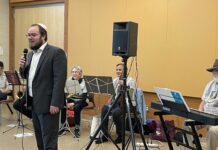
By Elana Sztokman
When Gloria Solomon was living in London’s suburbs with her husband and four sons, she cautioned her boys against wearing kippahs in the streets.
Their Jewish school bus was being stoned multiple times a week, and by 2005 the antisemitism was so overwhelming that she and her family decided to pick up and move to Florida. They always felt safe in their new US home — until Oct. 7.
Now, she says, “we feel more vulnerable here than we do in Israel.”
When Solomon’s youngest son, Noah, 25, told his parents of his plans to go on a Birthright Israel trip in January, Solomon could have been anxious. But she decided to take a different tack.
“I said, ‘If you want to go, go with my blessing,’” she recalled.
Despite the apparent dangers of traveling to a country at war, Solomon said she had faith that Birthright — the program that over 23 years has brought more than 850,000 young Jews to Israel on free 10-day trips — was doing everything necessary to ensure its trips were safe.
Other parents in her community in Florida expressed misgivings, but Solomon said that being a Jew right now in London or Miami is more dangerous than being in Israel — and that it’s important for Diaspora Jews to travel to Israel at this particular difficult moment.
“One of the best experiences my son had was volunteering on a farm,” Solomon said about a day her son spent harvesting fruit that had gone unpicked because many of Israel’s foreign agricultural laborers left after Oct. 7. “We are all big tree huggers in our family, and he said to me with such a depth of sadness that the fruit was rotting on the ground. He said it was heartbreaking because they don’t have the physical manpower to pick it and do what needs to be done. I could see how that affected him. It hit home.”
Since Oct. 7, some 500 young adults have gone on Birthright Israel’s free group trips to Israel for eligible Jewish 18-26-year olds, and 500 more are scheduled to arrive in March and April. While some participants have had to lobby their parents for permission to go, many parents say they find their adult children’s choice heartening — and that they’re seeing them return from their experiences newly motivated and inspired.
Debra Asher-Zitrin, 53, was supportive when her daughter Gillian decided to go on a Birthright trip in January. But the mother of three who works as a Jewish educator teaching Holocaust studies at Kol Ami synagogue in White Plains, New York, fielded deep concerns from her own parents. Her mother, a 79-year-old New York City schoolteacher who has never been to Israel and has no ties to Israel or relationships with Israelis, said it was a bad idea.
The family’s youngest daughter, Adena, 13, was also concerned. She was in touch with a 13-year-old friend from Kfar Aza, one of the Israeli communities that had been the site of a massacre on Oct. 7, and was frightened by the notion of Gillian traveling to Israel.
Asher-Zitrin talked with Gillian about their concerns. Gillian, a 21-year-old senior at Skidmore College, said she felt uncomfortable on her own campus, where anti-Israel demonstrations by pro-Palestinian groups had left her feeling deflated. That convinced Asher-Zitrin, who threw her weight behind Gillian’s decision to fly to Israel.
“We tried to explain to my parents how important it was that Gillian be allowed to go right now,” Asher-Zitrin said. “It’s very easy to go to Israel when the region is secure. But it’s more important as an American Jew to go now when Israel is not being portrayed as the most stable and secure location.”
To address parents’ concerns, Birthright held a Zoom meeting with parents to discuss security protocols. Most tour highlights are the same as on Birthright trips during regular times, including places like Masada, Jerusalem and Tel Aviv, but the tours now exclude stops in the Golan Heights or anywhere considered unsafe.
“I felt very comfortable once Birthright explained the situation,” Asher-Zitrin said. She was in regular contact with her daughter throughout the trip and always knew where the group was and what they were doing. “Gillian kept making me feel more and more comfortable that this was the best decision that we made as a family.”
When Zehava Fishman’s 23-year-old son, Alon, said he wanted to go on a Birthright trip in January, she was opposed. Zehava, 50, who was born in Israel and moved to New York in 2001, and remembers the feeling of being under rocket attack.
“I was 16 years old during the Gulf War,” she recalled, “when we had to run to the safe rooms and then sit there with masks on for hours. It’s not good. I didn’t want him to experience that.”
But Alon’s father, Zalman (Eugene) Fishman, felt differently.
“The moment that tragedy happened — I can’t talk about it too much because I get very emotional — I told my son that if I were him, I would be there not tomorrow but yesterday,” said Zalman, 51, the son of a Holocaust survivor. “There is so much you can do with your heart and your soul, to heal the wounded, to talk to them.”
Eventually, he convinced his wife to support Alon’s decision. It wasn’t until Alon returned from his trip, newly energized about Israel and his Jewish identity, that it was clear to his parents that they’d made the right decision in supporting the trip.
“I see much difference in Alon’s behavior and relationship with Judaism since he came back,” Zalman said, noting that Alon since has started coming with his father to synagogue on Friday nights.
“He came back more Jewishly connected,” observed his mother.
Many Birthright participants say that the elements of their trips connected to Israel’s current situation are what they’ve found most meaningful and uplifting. In addition to typical trip activities like hiking, visiting historical sites and swimming in the Dead Sea, groups are meeting with families of Israel’s hostages, talking with people affected by the war and volunteering in food rescue.
“The trip was amazing,” said Gillian Zitrin. “I loved experiencing Israeli culture — the food, the Kotel, speaking to Israelis.”
Her mother noted how Gillian returned from her trip newly motivated to stand up for Israel on campus.
“For Gillian, going to Israel on Birthright has completely empowered her and helped her communicate with people who are not informed about the history of the State of Israel,” Asher-Zitrin said. “She feels like she can now have dialogue with people on the other side in a more concrete way and less emotional way.”
Solomon said her son Noah came back already making preparations for another trip to Israel.
“Every single person I know who went came back with only positive experiences and enjoyed the entire encounter,” Zehava Fishman said. “I recommend everyone to go. There is so much to see in Israel and we have a wonderful country.”
This story was sponsored by and produced in partnership with Birthright Israel, which aims to give every young Jewish adult around the world the opportunity to visit Israel on an educational trip. This article was produced by JTA’s native content team.







